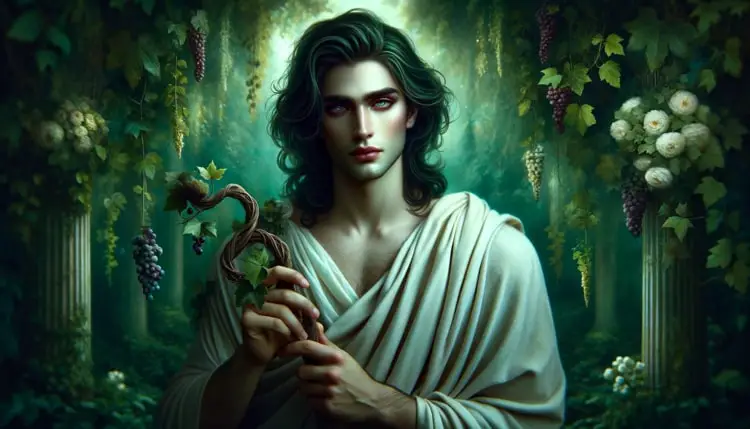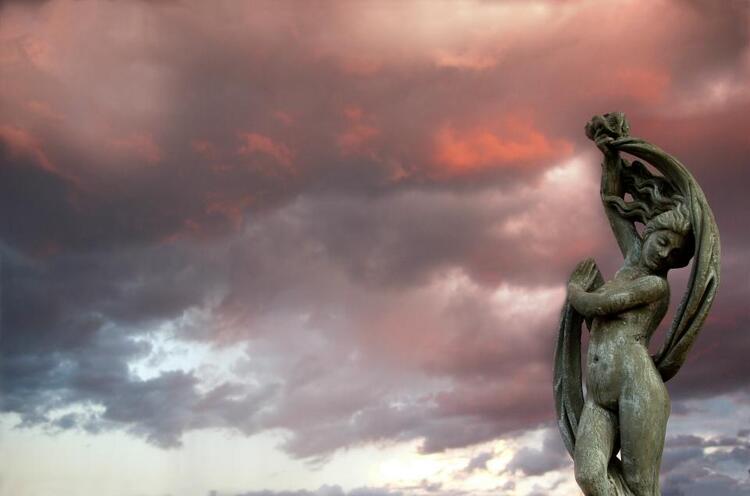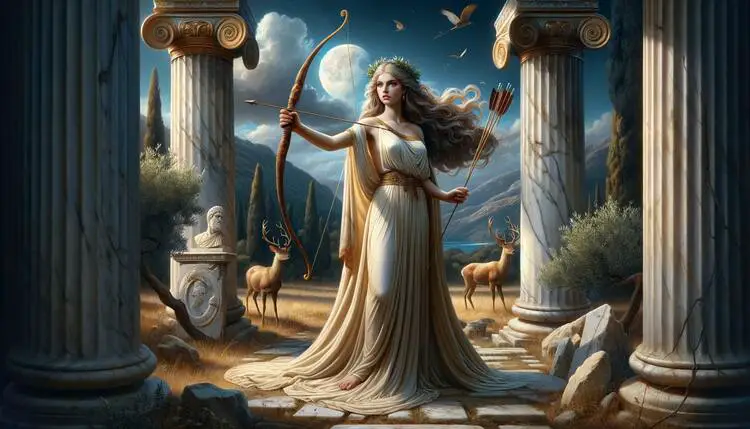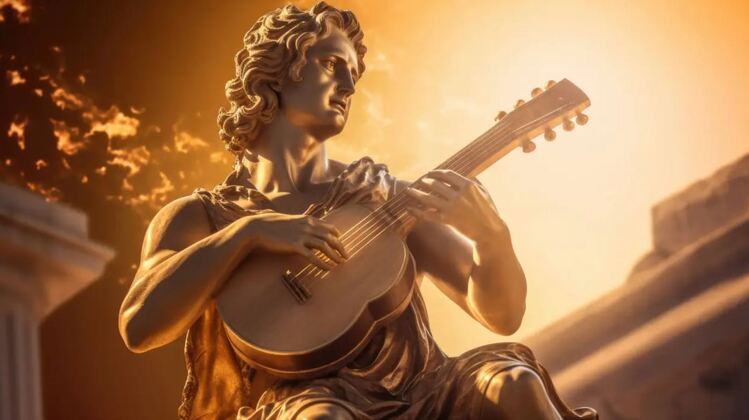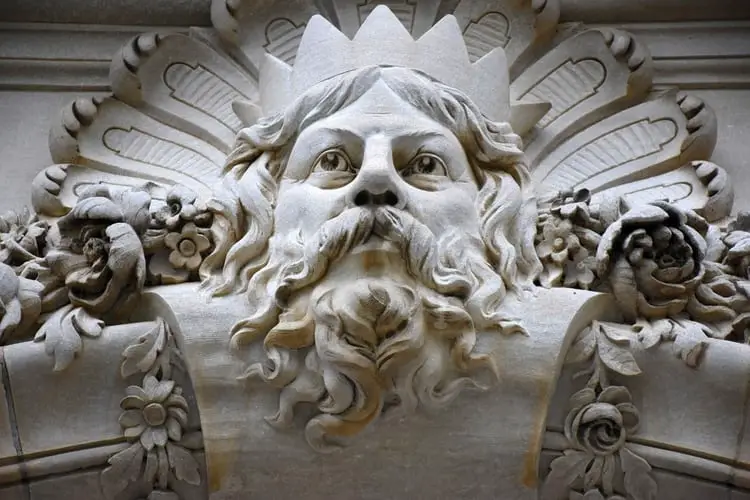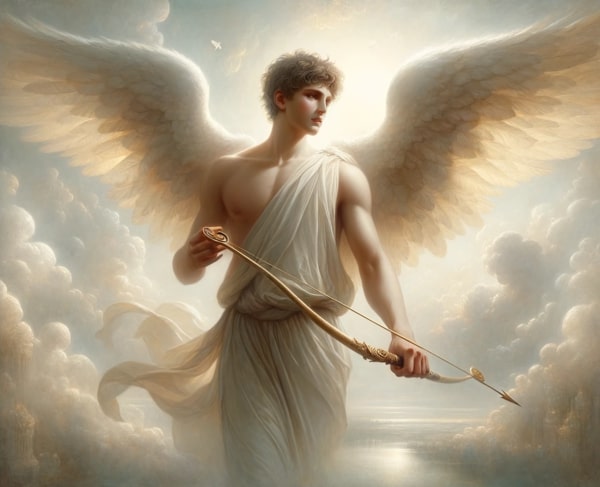How to Worship Dionysus: Ecstatic Rituals, Prayer, Offerings..
To engage in the worship of Dionysus, one must immerse oneself in the unique essence of this ancient deity of wine, ecstasy, and revelry. As a practitioner, you are not merely following a set of rituals; you are embarking on a deeply personal and transformative journey that is intrinsically tied to the spirit of Dionysus.
Begin by creating a sacred space, an altar that resonates with the energy of Dionysus. This is not just a physical space, but a portal to his realm. Adorn it with symbols that are deeply connected to him – vines, grapes, and wine, symbols of life’s perpetual cycle of growth and decay. Dionysus is not just a god of wine; he is the embodiment of the life force itself, flourishing and withering in an eternal dance. Your altar should reflect this profound duality.
As you invoke his presence, understand that Dionysus is a deity of many faces. He is the liberator, the one who frees us from the shackles of the mundane. He is the master of the revels, who delights in the abandonment of societal norms.
Speak to him as you would to an old, wild friend, with both reverence and a sense of shared joy. Light candles, burn incense like myrrh or frankincense, and let these scents be your messages to him, carried on the smoke that rises to his realm.
Offerings are crucial in this communion. Dionysus favors the fruits of the earth – wine, honey, and bread. When you present these offerings, do so not just as a ritual act, but as a sharing of your earthly joys and sorrows with him. In partaking of the wine, you partake of his spirit, allowing his essence to merge with yours.
But Dionysus is not a god to be worshipped in stillness and silence. He is a deity of ecstasy and frenzy. Engage in rituals that mirror his wild nature – dance, sing, let your body and voice express the joys and sorrows of life. Dionysus is found in these acts of unbridled expression, in the catharsis that comes from releasing your innermost feelings.
Now, allow me to share more specific rituals that you can perform by yourself and with a partner:
Dionysian Rituals
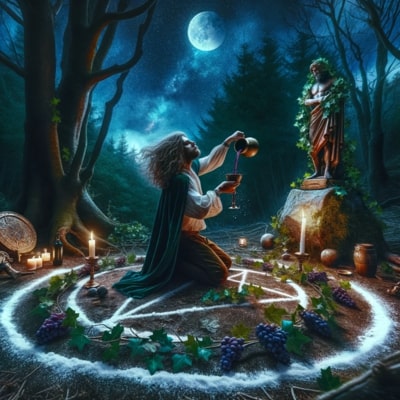
Dionysian Solitary Rapture
To perform this ecstatic ritual invocation of Dionysus, begin by creating an environment that resonates with his wild and untamed nature. This is a sacred space, but not one of solemnity and silence. Instead, it should pulse with life and vibrancy, much like the spirit of Dionysus himself.
Choose a place where you feel uninhibited and free, perhaps outdoors under the night sky, surrounded by the sounds of nature, or in a room where the air is thick with the scent of wine and earth.
Draw a circle on the ground, ideally with salt. As you prepare your space, gather symbols of Dionysus — grapes, ivy wreaths, a chalice of wine. Also, his physical representation such as a statue and corresponding crystals can also be part of the arrangement. These are not mere decorations; they are physical manifestations of his energy and presence. Arrange them with intention, knowing that each item is a beacon, calling to Dionysus across the veils of the mundane and the divine.
Begin the invocation with an offering. Pour wine onto the earth or into a bowl as a libation, a sacred act that forms a bridge between you and the divine. As you do this, speak your intentions aloud. This is not a formal prayer or chant; speak as if to an old friend, expressing your desire for Dionysus to join you in your ritual, to share in your joy and your search for ecstatic truth.
With the stage set and your intentions voiced, it’s time to invite Dionysus into your space through music and dance. Dionysian worship is deeply sensory and physical. Start with slow, rhythmic movements, perhaps accompanied by the beat of a drum or the strum of a lyre. As you move, let your body become a conduit for Dionysus’s energy. Feel the boundaries between yourself and the divine blur as the rhythm guides you into a state of trance.
As the ritual progresses, allow yourself to be overtaken by the spirit of Dionysus. This is where the true invocation happens — not in words, but in the ecstatic release of your innermost self. Dance wildly, let your voice rise in song or shout, express all the emotions and desires that are too often constrained by the norms of daily life. It is in this uninhibited expression that Dionysus is truly present.
As the ritual reaches its peak, you may find yourself in a state of euphoria, of divine madness. Embrace this as a sacred communion with Dionysus. In this space, the god of ecstasy reveals his truths, not through language, but through direct experience. You might receive visions, intense emotional insights, or a profound sense of oneness with the world.
Finally, as the ritual concludes, gradually bring yourself back to the present moment. Slow your movements, quiet the music, and take deep, grounding breaths. It’s important to acknowledge the end of the ritual, thanking Dionysus for his presence and guidance. Pour another libation as a final offering, and take a moment to reflect on the experience, journaling any insights or revelations that came to you.
Remember, an ecstatic ritual invocation of Dionysus is more than a set of actions; it’s an immersive, transformative experience that connects you deeply to the divine and to the primal essence of life itself.
The Bacchanalian Union
In this ritual you are honoring Dionysus with a partner. The essence is to blend the divine ecstasy associated with the god into the intimate connection between the two of you.
Start by choosing a private, comfortable space where you both feel a sense of sacredness and detachment from the everyday world. This could be a room adorned with items symbolizing Dionysus. Soft, ambient lighting, possibly from candles can set a mystical and intimate mood.
Begin the ritual with an act of purification, such as a shared bath. Incorporate fragrant oils or herbs that resonate with Dionysian themes, like myrtle or frankincense. This not only cleanses the body but also helps in transitioning your mindset from the ordinary to the spiritual, setting a tone of reverence and anticipation.
As you both emerge from the purification process, approach your altar or designated sacred space. Here, invoke Dionysus together. This doesn’t have to be a formal invocation; it can be as simple as expressing your shared desire to connect with each other and with the divine essence of Dionysus. You could read a poem, sing a song, or simply speak from the heart about what this experience means to both of you. You can also drink wine and dance.
With the atmosphere charged with divine presence, begin to explore each other. Remember, this ritual is about more than physical pleasure; it’s about spiritual and emotional connection. Let your movements, touches, and caresses be a dance of devotion, a physical manifestation of your inner desires and spiritual longing.
As the ritual progresses, let yourselves be carried away by the spirit of Dionysus. This god is all about breaking down barriers and transcending the mundane. Allow the energy of the god to flow through both of you, guiding you in your actions and emotions. It’s in this abandonment to the divine ecstasy where the profound spiritual connection can occur.
As the ritual reaches its culmination, take a moment to bask in the afterglow, acknowledging the sacredness of what you’ve shared. You might want to conclude with a final act of devotion to Dionysus, such as sharing a cup of wine, symbolizing the god’s essence that has infused your union.
Finally, gently transition back to the ordinary world. It’s important to ground yourselves after such an intense experience. Share your thoughts and feelings about the ritual, and perhaps plan to record your experiences in a journal. This not only helps in processing the spiritual journey you’ve undertaken but also strengthens the bond between you and your partner.
Dionysus Incantation
O Dionysus, of vine and rapture born,
Child of Zeus and Semele, in thunderstorm,
From Nysa’s nymphs to mortal lands you roamed,
Teaching the art of vine, in ancient loam.
Bearer of joy, liberator in wine’s embrace,
You traverse realms, both human and divine space.
In your grasp, the grape’s nectar transforms,
Uniting all under your ecstatic storms.
Shifter of forms, from man to beast you glide,
In your dual nature, our primal selves confide.
Maenads in frenzy dance, your power to attest,
In their wild cries, your spirit manifests.
Lord of life, death, rebirth, in cycle’s chain,
Your mysteries profound, in grape and grain.
From underworld depths to Olympus’ peak,
In your rites, the soul’s liberation we seek.
Kind to mortals, your miracles unfold,
Turning Midas’s touch from greed to mercy’s gold.
Pirates to dolphins transformed, in ocean’s dance,
A lesson in respect, in your mythic expanse.
Bacchus, in Roman tongue, your festivals roar,
A time when all are free, your spirit to adore.
In Bacchanalia’s grip, equality reigns,
In joy and terror, your dual nature maintains.
Protector of the outcast, patron of the wild,
In your embrace, the spirit of the reviled.
In your ecstatic throes, our true selves we find,
Breaking free from norms that to convention bind.
With cup raised high, in your sacred name,
We celebrate your gifts, your eternal flame.
O Dionysus, god of wine, joy, and renew,
In your honor, our spirits forever imbue.
Hail Dionysus, in your mysteries deep,
In the heart of the vine, your promises we keep.
May your dance of life within us forever sway,
In your boundless joy, we find our way.
Dionysus Prayer for Joy and Spiritual Elevation
O Dionysus, god of boundless joy and life’s fervent pulse,
Hear my humble prayer, in your vibrant realm I delve.
Grant me the courage to embrace life’s varied tapestry,
To find in every moment a spark of your divine ecstasy.
Bless me with the zeal of your wild, untamed vine,
May my days be enriched with experiences as fine.
In the mundane, let me discover the extraordinary,
In the simple, the essence of a joy visionary.
Teach me to dance to life’s rhythm, ever so free,
To savor each sip of existence, in your revelry.
In moments of sorrow, grant me your strength to endure,
In joyous times, the wisdom to remain pure.
Bestow upon me, O Dionysus, a spirit of adventure bold,
To seek out paths untrodden, stories yet untold.
In your honor, may I live with passion and grace,
Finding in the everyday, a wondrous embrace.
Like the vine that climbs and thrives in your name,
May my life grow with zest, untamed and untame.
In the highs and lows, your presence I seek,
For a life of fulfillment, vibrant and unique.
Hear this prayer, O Dionysus, god of wine and glee,
Bless my journey with laughter, love, and mystery.
In your eternal dance, may I joyfully partake,
For a life more fulfilling, for my own soul’s sake.
Hail Dionysus, in your mirth and madness,
Guide me to a life of richness, void of sadness.
In your divine revels, let my spirit soar,
For a life more exciting, now and evermore.
Symbols of Dionysus
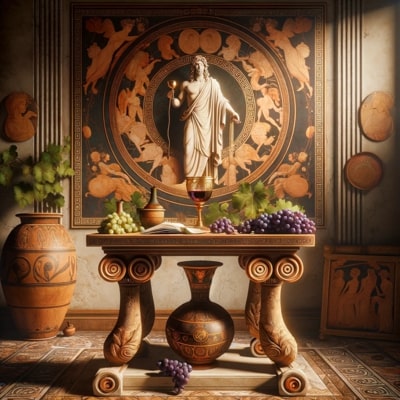
Dionysus is associated with several symbols that reflect his diverse aspects and powers. These symbols include:
- Grapes and Vines: Perhaps the most iconic symbol of Dionysus, representing wine and the cultivation of vines. They signify not only the intoxicating power of wine but also the cultural and spiritual significance of viticulture in ancient Greek society.
- Thyrsus: A staff or wand entwined with ivy and topped with a pinecone. The thyrsus is a symbol of prosperity, fertility, and pleasure. It was often carried by Dionysus and his followers, the Maenads and Satyrs.
- Leopard or Panther: Dionysus is often depicted with these animals or wearing their skins. They symbolize his status as a god who exists on the fringes of the wild and the civilized world, embodying the untamed and primal aspects of nature.
- Wine Cup (Kantharos): A type of ancient Greek cup typically used for drinking wine, often depicted in art as being held by Dionysus. It symbolizes the social and communal aspects of wine drinking, which were integral to ancient Greek culture.
- Ivy: A plant associated with Dionysus, symbolizing immortality and eternal life. Ivy is often depicted in art as wreathing the thyrsus or crowning Dionysus and his followers.
- Masks: Indicative of Dionysus’ connection to the theater and the duality of human nature. Masks were used in Greek theatre, which was an important part of religious festivals celebrating Dionysus.
- Figs: A fruit often associated with Dionysus, symbolizing fertility and sometimes linked to the secret rites and mysteries connected with his worship.
- Bull: In some myths, Dionysus is linked to the bull, symbolizing strength and virility. This connection may also represent the god’s ability to induce fear or panic, akin to a bull’s unpredictable nature.
These symbols collectively represent the many facets of Dionysus as a deity of life, joy, death, and rebirth, and they were often used in ancient rituals, altar decoration and art to invoke his presence and favor.
Crystals Associated With Dionysus
While the ancient Greeks didn’t directly associate crystals with their deities in the way modern ritual practitioners do, certain stones can be symbolically linked to the attributes and powers of Dionysus. Here are a few that resonate well with the energy of Dionysus:
- Amethyst: Traditionally believed to prevent drunkenness and overindulgence, amethyst could symbolize the moderation aspect in the worship of Dionysus, who is the god of wine. Its purple hues also associate it with royalty and spirituality, reflecting the divine nature of Dionysus.
- Tiger’s Eye: This stone, known for its grounding and protective properties, could be seen as a symbol of the balance between the civilized world and the wild, primal nature that Dionysus embodies.
- Carnelian: Associated with vitality, passion, and courage, carnelian resonates with the lively, energetic aspects of Dionysus, particularly his connection to festivals, dance, and celebration.
- Garnet: Often linked to passion, energy, and the life force, garnet could represent the fertility aspect of Dionysus as well as the intense emotional experiences he is known to induce.
- Bloodstone: Traditionally used for its grounding and revitalizing properties, bloodstone could symbolize the rebirth aspect of Dionysus’ mythology, as well as the endurance of his followers during ecstatic rites.
- Malachite: Known for transformation and clearing negative energies, malachite could be linked to the transformative experiences that Dionysian rituals aim to invoke.
- Rose Quartz: While Dionysus is often associated with more wild and ecstatic experiences, rose quartz, with its gentle energy of love and compassion, can be a reminder of the joy and pleasure that are also central to his worship.
Final Thoughts
Dionysus is the god of joy and adventure. Like wine, he lifts the spirits. He is associated with the elements of Fire, Water and Air. If you are not an adventurous spirit but would like to be, invoking Dionysus can lead to a transformation in that direction. But be vary if you are already adventurous and a risk taker. In that case the grounding influence of Demeter would be better.
Remember, balance along with spiritual progress is the most important part of theurgy and magic in general. If you’re unbalanced you’ll run into problems. So use these rituals and prayers if you’re already too wise by nature and need some unruly energy that typically adorns the unruly youth.
